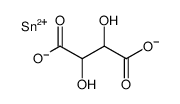815-85-0
| 中文名 | 酒石酸亚锡 |
|---|---|
| 英文名 | 2,3-dihydroxybutanedioate,tin(2+) |
| 英文别名 |
Butanedioic acid,2,3-dihydroxy-(2R,3R)-,tin(2+) salt (1:1)
Stannous tartrate (R-(R*,R*))-2,3-Dihydroxybutanedioic acid Butanedioic acid,2,3-dihydroxy-,(R-(R*,R*))-,tin(2+) salt (1:1) Lg-tartaric acid,tin (II)-Lg-tartrate Tartaric acid,tin(2+) salt (1:1) EINECS 212-427-1 Tin (R-(R*,R*))-tartrate MFCD00054358 Sn(II) tartrate Lg-Weinsaeure,Zinn(II)-Lg-tartrat |
| 沸点 | 399.3ºC at 760 mmHg |
|---|---|
| 分子式 | C4H4O6Sn |
| 分子量 | 266.77200 |
| 闪点 | 209.4ºC |
| 精确质量 | 267.90300 |
| PSA | 120.72000 |
| 外观性状 | Powder | off-white |
| 储存条件 | 保持容器密封,储存在阴凉,干燥的地方 |
| 稳定性 | 常温常压下稳定,避免氧化物接触 |
| 水溶解性 | slightly soluble in water. |
| 计算化学 | 1.疏水参数计算参考值(XlogP):无 2.氢键供体数量:2 3.氢键受体数量:6 4.可旋转化学键数量:1 5.互变异构体数量:无 6.拓扑分子极性表面积121 7.重原子数量:11 8.表面电荷:0 9.复杂度:123 10.同位素原子数量:0 11.确定原子立构中心数量:0 12.不确定原子立构中心数量:2 13.确定化学键立构中心数量:0 14.不确定化学键立构中心数量:0 15.共价键单元数量:2 |
| 更多 | 1. 性状:白色粉末 2. 密度(g/mL,25/4℃):未确定 3. 相对蒸汽密度(g/mL,空气=1):未确定 4. 熔点(ºC):未确定 5. 沸点(ºC,常压):未确定 6. 沸点(ºC,5.2kPa):未确定 7. 折射率:未确定 8. 闪点(ºC):未确定 9. 比旋光度(º):未确定 10. 自燃点或引燃温度(ºC):未确定 11. 蒸气压(kPa,25ºC):未确定 12. 饱和蒸气压(kPa,60ºC):未确定 13. 燃烧热(KJ/mol):未确定 14. 临界温度(ºC):未确定 15. 临界压力(KPa):未确定 16. 油水(辛醇/水)分配系数的对数值:未确定 17. 爆炸上限(%,V/V):未确定 18. 爆炸下限(%,V/V):未确定 19. 溶解性:未确定 |
|
Section 1: Product Identification Chemical Name:Tin (II) tartrate hydrate, min. 95% CAS Registry Number:815-85-0 Formula:SnC4H4O6.XH2O EINECS Number:212-427-1 Chemical Family:metal acetate salt Synonym:Stannous tartrate, Tartaric acid, tin(2+) salt (1:1)
Section 2: Composition and Information on Ingredients IngredientCAS NumberPercentACGIH (TWA)OSHA (PEL) Title Compound815-85-0100%2mg/m3 (as Sn2mg/m3 (as Sn Section 3: Hazards Identification Dust may be irritating to the nose, mucous membranes and respiratory tract. Benign pneumoconiosis may Emergency Overview: result. Primary Routes of Exposure:Ingestion, Inhalation of dust. Eye Contact:May cause slight to mild irritation of the eyes. Skin Contact:May cause slight to mild irritation of the skin. Dust may be irritating to the nose, mucous membranes and respiratory tract. Benign pneumoconiosis may Inhalation: result. Ingestion:No information on the physiological effects of ingestion. Acute Health Affects:May be irritating to skin, eyes and respiratory tract. Chronic Health Affects:Prolonged exposure to dust may result in benign pneumoconiosis. NTP:No IARC:No OSHA:No SECTION 4: First Aid Measures Immediately flush the eyes with copious amounts of water for at least 10-15 minutes. A victim may need Eye Exposure: assistance in keeping their eye lids open. Get immediate medical attention. Wash the affected area with water. Remove contaminated clothes if necessary. Seek medical assistance if Skin Exposure: irritation persists. Remove the victim to fresh air. Closely monitor the victim for signs of respiratory problems, such as difficulty Inhalation: in breathing, coughing, wheezing, or pain. In such cases seek immediate medical assistance. Seek medical attention immediately. Keep the victim calm. Give the victim water (only if conscious). Induce Ingestion: vomiting only if directed by medical personnel. SECTION 5: Fire Fighting Measures Flash Point:not applicable Autoignition Temperature:no data Explosion Limits:none Extinguishing Medium:carbon dioxide or dry powder Fire fighters should be equipped with a NIOSH approved positive pressure self-contained breathing apparatus Special Fire Fighting Procedures: and full protective clothing. Hazardous Combustion andIf involved in a fire this material may emit toxic organic fumes. Decomposion Products: Unusual Fire or Explosion Hazards: No unusual fire or explosion hazards. SECTION 6: Accidental Release Measures Spill and Leak Procedures:Small spills can be mixed with vermiculite or sodium carbonate and swept up. SECTION 7: Handling and Storage Handling and Storage:Store in a sealed container. Keep away from heat and moisture. SECTION 8: Exposure Controls and Personal Protection Eye Protection:Always wear approved safety glasses when handling a chemical substance in the laboratory. Skin Protection:Wear appropriate chemical resistant gloves and protective clothing. Ventilation:Material may form a fine dust. If possible, handle the material in an efficient fume hood. If ventilation is not available a respirator should be worn. The use of respirators requires a Respirator Respirator: Protection Program to be in compliance with 29 CFR 1910.134. Ventilation:Material may form a fine dust. If possible, handle the material in an efficient fume hood. Additional Protection:No additional protection required. SECTION 9: Physical and Chemical Properties Color and Form:off-white pwdr. Molecular Weight:266.76 Melting Point:no data Boiling Point:no data Vapor Pressure:not applicable Specific Gravity:no data Odor:none Solubility in Water:insoluble SECTION 10: Stability and Reactivity Stability:air and moisture stable Hazardous Polymerization:no hazardous polymerization Conditions to Avoid:none Incompatibility:strong oxidizing agents and halogens Decomposition Products:carbon monoxide, carbon dioxide, tin oxide, and organic fumes. SECTION 11: Toxicological Information RTECS Data:Oral (rat); TDLo: 11413mg/kg/4W-C. Oral (rat); TDLo: 37093mg/kg/13W-C. Carcinogenic Effects:No data available Mutagenic Effects:No data available Tetratogenic Effects:No data available SECTION 12: Ecological Information Ecological Information:No information available SECTION 13: Disposal Considerations Disposal:Dispose of according to federal, state, and local regulations. SECTION 14: Transportation Shipping Name (CFR):Non-hazardous Hazard Class (CFR):NA Additional Hazard Class (CFR):NA Packaging Group (CFR):NA UN ID Number (CFR):NA Shipping Name (IATA):Non-hazardous Hazard Class (IATA):NA Additional Hazard Class (IATA):NA Packaging Group (IATA):NA UN ID Number (IATA):NA SECTION 15: Regulatory Information TSCA:Listed in the TSCA inventory. SARA (Title 313):Title compound not listed. Second Ingredient:none SECTION 16 - ADDITIONAL INFORMATION N/A |
|
生态学数据: 对水是稍微有害的,不要让未稀释或大量的产品接触地下水,水道或者污水系统,若无政府许可,勿将材料排入周围环境
|
| WGK德国 | 3 |
|---|---|
| RTECS号 | EJ9892500 |


